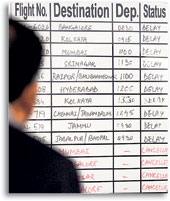 |
Every year, with the advent of winter, Goutam Mitra starts developing cold feet. A frequent flier, the Mumbai-based chartered accountant dreads the fog that descends over northern India at this time of the year to throw air travel out of gear and upset his travel plans. “Delays and cancellations are inevitable and I am left stranded in airports,” he says, adding that in the past, he has missed several important appointments, thanks to the fog.
Mitra isn’t the only one who’s wary of this climatic phenomenon. Each winter, hundreds of domestic fliers in India have their travel itineraries turned on their heads by the fog that sets in over north India — particularly over Delhi. The season of 2006-07 has proved to be no different thus far. Through December and early January, scores of flights coming to Delhi were diverted to places such as Chandigarh, Lucknow and Jaipur due to poor visibility at the capital’s Indira Gandhi Domestic Airport, while those scheduled to take off were forced to wait for better visibility. The delays resulted in a traffic bottleneck that led to complete mayhem in the terminal, even as domestic airlines and airport authorities indulged themselves in the old game of passing the buck.
But at the end of the day, for every appointment missed or business deal flushed down the drain, who does the consumer hold accountable? And what is the exact amount of compensation that they are entitled to, if at all?
For starters, Indian civil aviation laws don’t provide much in case of fog-related flight delays or cancellations. Thus, in such an event, the airline is not liable to pay for anything more than suitable food and lodging — according to the class of the traveller and the profile of the airline — and make alternative flight arrangements. Under current norms, most airlines abide by these directives, depending on their profiles.
Kingfisher Airlines, for example, doesn’t provide compensation in cash in the event of cancellation. “But if the delays are long, we provide passengers with food and, if need be, accommodation as well,” says Ritu Bararia, senior manager, corporate affairs and PR, Kingfisher Airlines. “In case of cancellations, we either accommodate our ticket holders in some other airlines’ flights or our succeeding flights, besides providing accommodation.”
Low-cost carriers, on the other hand, normally don’t even serve refreshments free of cost to their passengers. It was only after the directorate general of civil aviation (DGCA) issued a directive in December asking them to be proactive on that front that low-cost carriers also began providing certain comforts to their passengers. Clearly, it’s a scene where a passenger is extended amenities solely according to the airline he or she chooses to fly with.
However, some airlines have also taken the initiative to provide monetary compensation for cancelled flights. “Subject to availability, we book our passengers on flights of other airlines and upon cancellation of tickets, a full refund is provided,” says Arun Upadhyay, customer service representative, Air Deccan, Calcutta.
But the fact still remains that airline laws have no cover for botched itineraries, so airlines cannot be taken directly to court over issues such as missed appointments. Nevertheless, the Consumer Protection Act (CPA) provides some sort of relief by addressing the issue of consumer satisfaction from commodities or services of everyday social use.
Points out noted lawyer and consumer activist Prabir Basu, “Compensation claimed by a passenger can be statutory, compulsory compensation — as fixed under law — payable by the airline to its customer under specific situations, or contractual, whose amount is not fixed but can be modified as according to the situation and circumstances, following the clauses in the contract signed between the airline and the passenger.”
Of significant importance here is failure on part of some airlines to technologically upgrade their fleet to comply with CAT II/III norms, and train and position adequate numbers of pilots to operate under fog cover. These flaws, says Basu, can be cited by passengers since compliance with the norms would ideally allow airlines companies to render better service, and have the consumer better cared for.
“The failure by some airlines to comply with the DGCA directive during the foggy stretch was gross negligence, since delays caused by them even held up those airlines who were equipped to operate in the fog,” says Kanu Gohain, director-general, civil aviation, government of India. “And while the DGCA would take this matter up at the highest level, it is up to consumers to hold the airlines accountable on their end.”
However, most airlines say they aren’t sitting back on the issue either. Some, such as Indian, Kingfisher Airlines, Jet Airways and Indigo have already met the mark in making their fleets CAT-compliant, while others have worked steadily on it. “All our Airbus A-320 aircraft are CAT III compatible and placed in Delhi,” says Rajiv Kothiyal, chief pilot, Air Deccan. “Besides, we have 93 pilots trained in CAT II/CAT III flying. We are now approaching DGCA to get CAT III endorsement on our operator license in order to minimise inconvenience caused to passengers during this period,” he adds.
Going by one’s previous experiences, lessons are learnt every winter, only to be forgotten soon after. Till then, fliers could do well to read the fine print on the back of their air tickets, and decide which airline suits them best.










